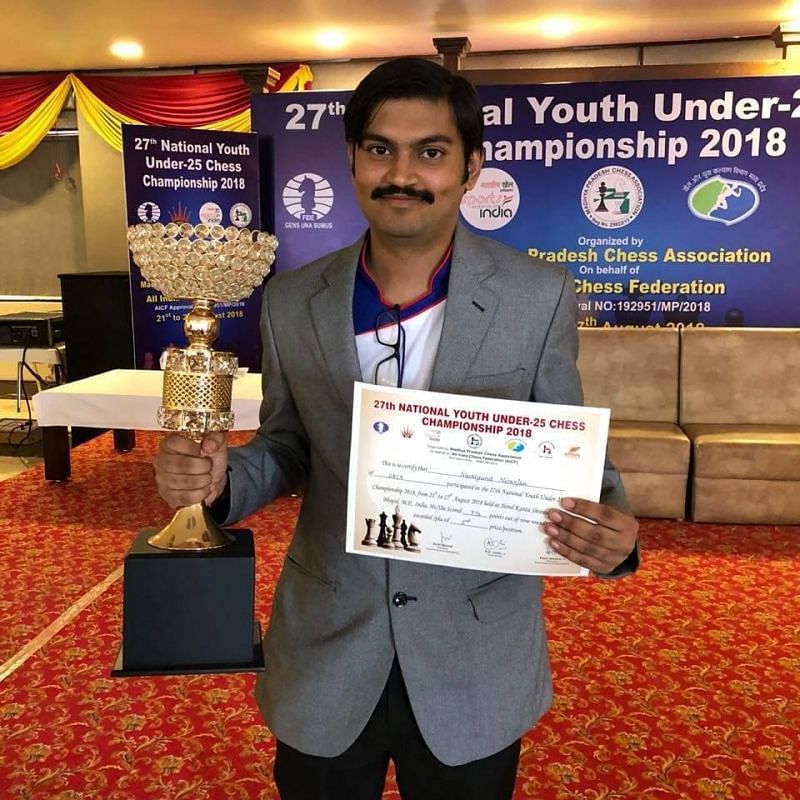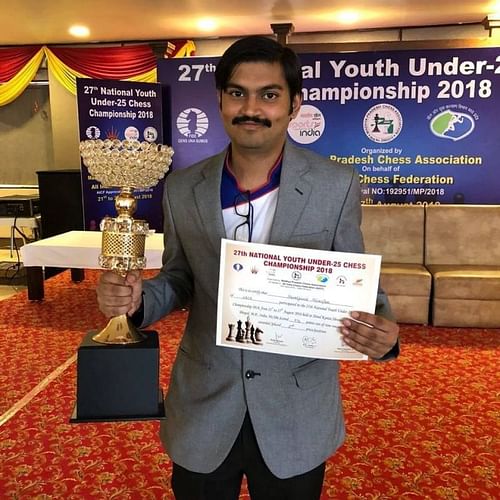
India at the Para Olympiad: In conversation with FM Niranjan Navalgund

Niranjan Navalgund is an Indian FIDE Master (FM) with a GM norm. He is currently working for Chess.com India. He has written books and has a flair for literature. Navalgund recently served as the coach of two Indian teams participating in the 1st ever FIDE Online Para Olympiad.
In this exclusive interview, we find out about his selection process to train the squads, the experience, and his learnings. We also gain an understanding of how chess is an inclusive sport.
The excerpts:
Q: Can you please introduce yourself to us?
To put it briefly, I play and teach chess, and dabble in writing haiku, stories, and articles. Currently, I'm working as a community manager for Chess.com India.
Q: How did you get involved with chess? What have been some of your most memorable moments?
I was the monitor of the class while I was in Grade 4. After the assembly, I read out the notification that there was a chess tournament in the district, and it was open to school students. Upon seeing no immediate response from the students, my class teacher suggested that I go and compete in the event.
I told him that I didn't know the game. He insisted that I learn it and practice a bit as the tournament was a week away. I got back home, told my father about it. Fortunately, my friend's dad had gifted me a chess set on my birthday and that came in handy. That evening, I learned the basics of chess.
Winning the State Sub-junior in my hometown (2009) was memorable. Clinching the National U-17 title was special too. It opened the doors to the Asian, Commonwealth, and World events. I also got a silver medal in the Commonwealth Championships that year.
Attaining my GM norm was fun. Players usually get IM norms and then head on to attaining GM norms. In my case, I directly achieved a GM norm first, which was nice. I also consider that winning the Open State championship in Tamil Nadu was one of the best accomplishments. I currently represent Karnataka.
Apart from chess, getting my book 'The Lively Library & An Unlikely Romance' published by Readomania was also memorable.
Q: What can you say about chess as an inclusive mind sport?
Picking hints from the game itself, I can say that it is one of equality. One might say that white has the first move advantage, but black is the first player to get information through white's first move. The balance within the game and the rules reflect on the outside and make it inclusive for everybody to play irrespective of the differences.
Q: How were you selected to be the coach for the Indian Para Olympiad team?
Kishan Gangolli, a player on the first team, got in touch with me after he had briefly shortlisted some coaches. After understanding the requirement, I agreed to be the trainer. Initially, it was just Team 3, and then, due to some changes, I was asked if I could take care of Team 4 as well.
Also, I knew some of the players. I had met and interacted with them during the coaching session I did as a part of the Project Checkmate 2.0 program.
Q: Share your experience of working as the coach for these teams.
This was my first official engagement as a coach for the Indian team, and I was very excited to take up this project. It was satisfying and there were many memorable moments. For instance, one of our players clicked on the "resign" button, instead of the "offer draw" one, and then the game ended there. After we made a request, the arbiters conveyed it to the opponent, and the Romanian player agreed to resume the match, which was very sportive.
There was also a question of colors. Some players had to play black because of the changes in the board order after every game. So, we used to joke about who gets to play with the next black pieces in our meetings. The priority during the second half of the event was to give a chance to all the competitors in the team, and I'm glad we managed that. Only one out of the 16 players did not play because of a problem with his laptop.
I personally learned a lot during the interaction with the participants. It was also nice to have made a positive impact on their lives.
Q: What was the overall journey like, in this tournament for India?
I did a few meetings with both the teams before the event to understand the challenges involved. From these meetings, I also learned about the playing styles of the different players in the team. I had a lot of options, but the board order was already sent by the federation. It meant that I had to make do with what I had and could not implement new plans for both the teams.
Plus, the rules also changed. Initially, they selected 2 visually challenged, 2 physically challenged, 2 participants having a hearing impairment, and 2 women players. We were under the impression that this would be followed by all the federations. However, later it was changed.
Before the event, I set some basic strategies for the teams like how to approach a position, things to do before and after the game, and so on.
During the event, I focused specifically on the players who were playing the round. On most days, we decided the board orders quite early on, so that players get enough time to prepare. My role also involved choosing the board order and sending it to the arbiters.
It was interesting to fix some of the repertoires of the players. In the last team meeting, I got positive feedback from the players that they gained a lot of benefit out of the work we did, especially on the openings. Some of these players had not received training like that before. I'm glad it worked out well and that this experience has made them all better chess players.
Q: What steps can be taken to improve the quality of chess for these Indian teams?
I think that consistent practice has to be adopted by all the players. If you train only during the event or just before it, it may not be good for the long run. Some camps could boost their level and help them in improving their overall chess abilities. The federations could consider doing some events to encourage the players to keep practicing. If some companies come forward to support the initiatives of the federations, it will benefit the entire fraternity.
Q: What are your own future goals?
At a personal level, I want to make norms and attain the IM/GM title. I have a GM norm already and will be hoping to play and do well in the events whenever they take place. I'm also happy with the work I'm doing at Chess.com and want to elevate the growth of the company even further.
Q: How do you see yourself being involved in promoting inclusive chess?
By being associated with events like camps or FIDE Olympiad for PWD, I'm already promoting the same. If my schedule is in sync with opportunities of a similar nature, I'll try to give my time.
Q: Finally, any advice you would like to share with the readers?
Encourage chess and chess players. It is a wonderful sport, and I would urge you all to make it a part of your everyday life.